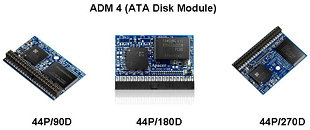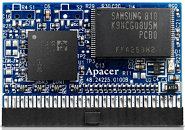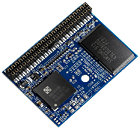Monday, September 12th 2011
Apacer Unveils The Next-Gen Industrial Modular PATA SSD
Apacer Technology Inc., the global leader in memory module, demonstrates its outstanding customizability by rolling out the next-generation industrial modular PATA SSD for embedded/Thin Client devices: ADM 4 (ATA Disk Module). ADM4 boasts the slimmest profile among Apacer's PATA SSDs. It adopts a 44-pin connector and can be used either in parallel (at 180°) or perpendicularly (at 90° or 270°) for various mechanisms. The just-launched next-generation modular SSD breaks through the speed barriers by reaching the read/write speed of as fast as 80/50 MB/sec, which is several times higher than its predecessors. Widely recognized by Thin Client device users for its extreme reliability, the ADM series has made Apacer one of the main SSD suppliers for Thin Client systems around the world.The new modular SSD ADM 4 (ATA Disk Module 4), available in capacities from 1 GB to 16 GB, adopts a highly reliable SLC (Single-Level-Cell) chip. In order to be used in stringent environments, products of the series are all designed to operate at extended temperatures (-40 ° C - 85 ° C). The integration of both S.M.A.R.T (Self-Monitoring, Analysis, and Reporting Technology) and intelligent power failure recovery function helps ensure data safety while enhancing product stability. "SATA interface has gone mainstream in the embedded market, though," indicated Apacer, "PATA interface is still widely used due to its earlier application. To address IPC customers' actual needs, Apacer has been launching new products with PATA interface. This not only prevents it from out-of-stock but also boosts the performance and stability of customers' existing platforms."
In consideration of price and capacity, Apacer further introduced another product line based on the cost-effective MLC (Multi-Level Cell): ADM 4-M. Its capacity reaches up to 64 GB, with the maximum sequential read/write speed being 75/25 MB/sec. Advantages also include resistance to shock/vibration as well as low power consumption, which make it the best alternative to traditional hard drives.
Samples of ADM4 and ADM4-M product lines are now available for customers to run test. Please contact your local Apacer sales representatives.
In consideration of price and capacity, Apacer further introduced another product line based on the cost-effective MLC (Multi-Level Cell): ADM 4-M. Its capacity reaches up to 64 GB, with the maximum sequential read/write speed being 75/25 MB/sec. Advantages also include resistance to shock/vibration as well as low power consumption, which make it the best alternative to traditional hard drives.
Samples of ADM4 and ADM4-M product lines are now available for customers to run test. Please contact your local Apacer sales representatives.



14 Comments on Apacer Unveils The Next-Gen Industrial Modular PATA SSD
Although this thing looks like it's just a compact, vibration tolerant solution more than anything else.
Most people complain about sata III and it's bottle necks / slow performance, same for USB3.0 that is why Apple jumped to something that no one uses and nothing is available for thunderbolt just to tick their Apple customers off and be able to justify their primitive hardware they sell as new.
I can not imagine who would still use PATA and those that own PATA obviously don't have money to upgrade their pc's to i686 or for this PATA SSD purchase.
And if a machine was both important enough to cost millions per day and old enough to not have SATA ports you are failing as a business as it should have been replaced in by now. And before you whip out the "that is more expensive card" a simply PCI to SATA card could have been used to switch to a faster, more reliable port.
I am sure Apacer has some very very very special purpose for this, but I just don't see how this is the optimal solution to any problem.
I get all the "out with the old, in with the new" vibe but for business ROI is king. I think that Apacer wouldn't develop this just for shit and giggles, there surely must be some market that we don't know about.
For larger companies, it is not a vibe, it is a requirement to survive. A relatively small piece of equipment that does its job well like your TME-HC 912 being outdated means nothing. A multi-million dollar company refusing to update a piece of equipment that is essential to their business is suicide. We are talking about different situations.
And as for the last part, you should simply read the last sentence I wrote again.